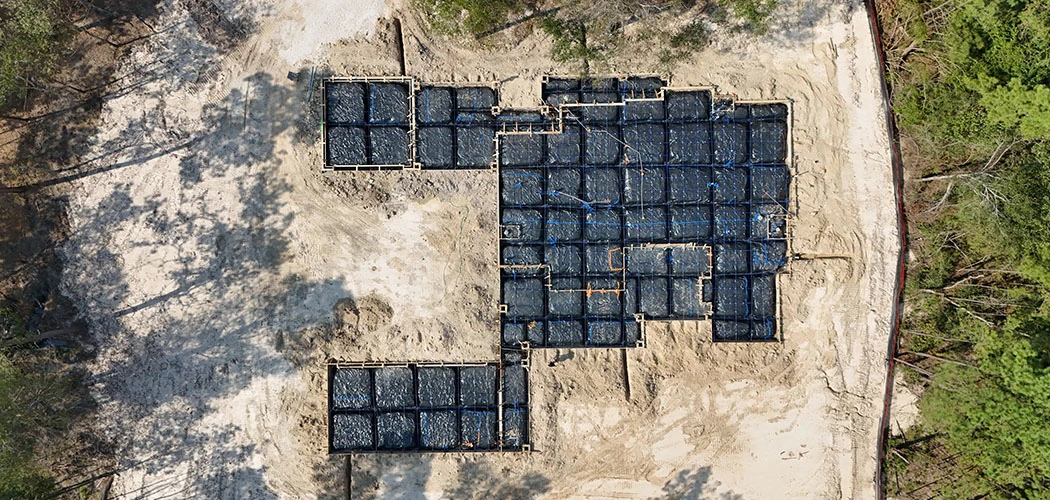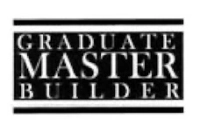Which Type of Foundation is Right for My Custom Home in Houston, Texas?
Understanding the Importance of Foundation Choice
Choosing the right foundation is one of the most important decisions you'll make when building your custom home. The foundation is the most important component of any structure, providing the stability your home needs to last for generations. An under-designed foundation can lead to costly problems down the road, while an over-designed foundation might mean you're paying more than necessary. Getting a site specific soil analysis is essential to ensure your foundation is perfectly tailored to your specific site conditions.

Exploring the Different Types of Foundations
When building in Houston, Texas, the choice of foundation is influenced by the region’s variable soil conditions, topography, and flood concerns. Here’s a look at the most common foundation types:
Slab-on-Grade
- Post-Tension: A floating foundation that is especially popular in mildly expansive soils, such as those generally found in the Houston area. This type minimizes surface cracking, is economical, and allows for quicker construction. It also offers decent design flexibility, making it a preferred choice for many homeowners in the area.
- Conventional Rebar: A stiffer foundation option that, while more prone to surface cracking, provides exceptional design flexibility. It is more expensive than post-tension foundations and is commonly considered for large, complex homes with a lot of dimensions.
Pier and Beam
Often referred to as Raised Floor or Crawlspace foundations, this type is common in flood-prone areas. It minimizes site work and comes with a wide price range. Pier and Beam foundations can become complex and have poor design flexibility.
Basement
Basements are generally not recommended in Houston due to the region’s high water table and clay-rich soil, which can lead to significant moisture issues and structural challenges. While basements can provide additional living or storage space in other regions, they are typically not a viable option in Houston's environment.
Structural Slab (Void Boxes)
This type of foundation performs exceptionally well in expansive soils, reducing the need for extensive site excavation in areas prone to soil movement. However, it is generally the most expensive option.
When to Consider Piers
In certain situations, adding piers to your foundation can provide additional stability and support, especially in challenging conditions:
- Highly Expansive Soils: Piers help manage soil movement, providing a stable base for your home even when soils expand and contract.
- Significant Elevation Changes and Pad Height: Piers can help mitigate erosion and washout issues. Especially on tall pads necessary on properties with significant elevation changes.
- Close Proximity to Water Sources: Homes near lakes, ponds, or creeks may benefit from the additional support provided by piers.
- Pier and Beam Foundations: Piers are a standard component of these foundations, providing necessary elevation and stability.
Key Factors to Consider When Choosing a Foundation
When deciding on the right foundation for your home, several factors come into play:
- Soil Conditions: This is the most critical factor. Concrete and steel are extremely durable, but the soil beneath them can cause problems if not properly analyzed and accounted for. A soil analysis by a local geotechnical engineering firm is crucial before designing any foundation.
- Water Table: The local water table can influence your foundation choice, especially in areas prone to flooding
- Climate: Houston’s hot, humid climate can impact foundation performance, particularly in terms of moisture management.
- Floodplain: Foundations like pier and beam and void boxes tend to perform better in flood-prone areas.
- Shape: Conventional rebar and void box foundations are often recommended for large or highly dimensional homes.
Considerations for Each Foundation Type
When evaluating different foundation types, consider the following factors:
- Cost: Initial construction costs can vary widely depending on the foundation type and site conditions.
- Durability: Some foundations are better suited to Houston’s climate and soil conditions, offering greater long-term durability.
- Maintenance: Some foundation types require more maintenance over time, especially in areas with expansive soils.
Choosing the Right Foundation for Your Home
Selecting the right foundation is a complex process that involves consulting with experts and considering local building codes and regulations:
- Consulting with Experts: A soil analysis is a must. Work with local geotechnical and structural engineers to design a foundation that meets your home’s specific needs.
- Building Codes and Regulations: Ensure your foundation complies with all local building codes and regulations, which can vary by area.
Empowering Your Owner-Builder Journey with Built Green Custom Homes
At Built Green Custom Homes, we understand the complexities of the owner-builder journey, and we’re here to support you every step of the way. Our goal is to provide you with the tools, knowledge, and resources necessary to make your home-building experience both successful and cost-effective.
To help you navigate this process, we offer Free Building Classes designed to equip you with the essential skills and understanding needed to manage your build confidently. These classes cover everything from planning and budgeting to construction techniques, ensuring you’re well-prepared for each stage of the project.
For financing, we provide Owner-Builder Financing Options tailored to meet the specific needs of owner-builders. This includes access to construction loans and 1x Close loans, simplifying the financing process and giving you greater control over your budget.
By empowering owner-builders with valuable resources, we help you maximize your savings while ensuring a smooth and successful home-building experience. For more insights and tips, be sure to explore our blog section, where we share in-depth guides and industry knowledge.
Contact us today to learn more about how we can help you achieve your dream home on your terms.
Frequently Asked Questions
What is the most common type of foundation used in Houston, Texas?
The most common foundation type in Houston is the slab-on-grade foundation, particularly the post-tension slab. This is due to its suitability for the region’s mildly expansive soils and its cost-effectiveness.
Why are basements not commonly built in Houston?
Basements are not common in Houston because the area has a high water table and clay-rich soils. These conditions can cause moisture issues and make basement construction costly and challenging.
What is a soil analysis, and why is it important?
A soil analysis involves testing the soil on your property to determine its composition and stability. This is crucial because the foundation's performance largely depends on the type of soil it rests on. A proper soil analysis helps in designing a foundation that can handle local soil conditions effectively.
What is the difference between post-tension and conventional rebar slab foundations?
Post-tension slab foundations use tensioned steel cables to minimize surface cracking and allow for quicker construction. Conventional rebar slabs, on the other hand, use steel rods and are generally stiffer but more prone to surface cracking. The choice depends on the design requirements and soil conditions.
Are pier and beam foundations a good choice for flood-prone areas in Houston?
Yes, pier and beam foundations are often recommended for flood-prone areas because they elevate the home above ground level, reducing the risk of flood damage.
How do I know if I need piers in my foundation?
Piers may be necessary if your property has highly expansive soils, significant elevation changes, or is close to a water source like a lake or creek. A soil analysis can help determine if piers are required.
What are void box foundations, and when should they be used?
Void box foundations are structural slabs designed to perform well in areas with expansive soils. They reduce site excavation and are often used in regions prone to soil movement, although they are more expensive than other foundation types.
What factors affect the cost of a foundation?
The cost of a foundation is influenced by several factors, including soil conditions, foundation type, concrete beam width and depth, the complexity of the home’s design, and any additional features like piers. Site-specific factors like water table and floodplain status also play a role.
Should I consider future maintenance when choosing a foundation?
Absolutely. Some foundation types require more maintenance than others, especially in Houston’s challenging soil conditions. It’s important to discuss maintenance requirements with your builder and choose a foundation that balances upfront costs with long-term durability.
What role do local building codes play in foundation design?
Local building codes dictate the minimum requirements for foundation design to ensure safety and durability. It’s important to work with professionals who are familiar with Houston’s codes and regulations to ensure your foundation meets all necessary standards.
Questions? Comments? Contact Us for more information


 Free Building Classes
Free Building Classes




